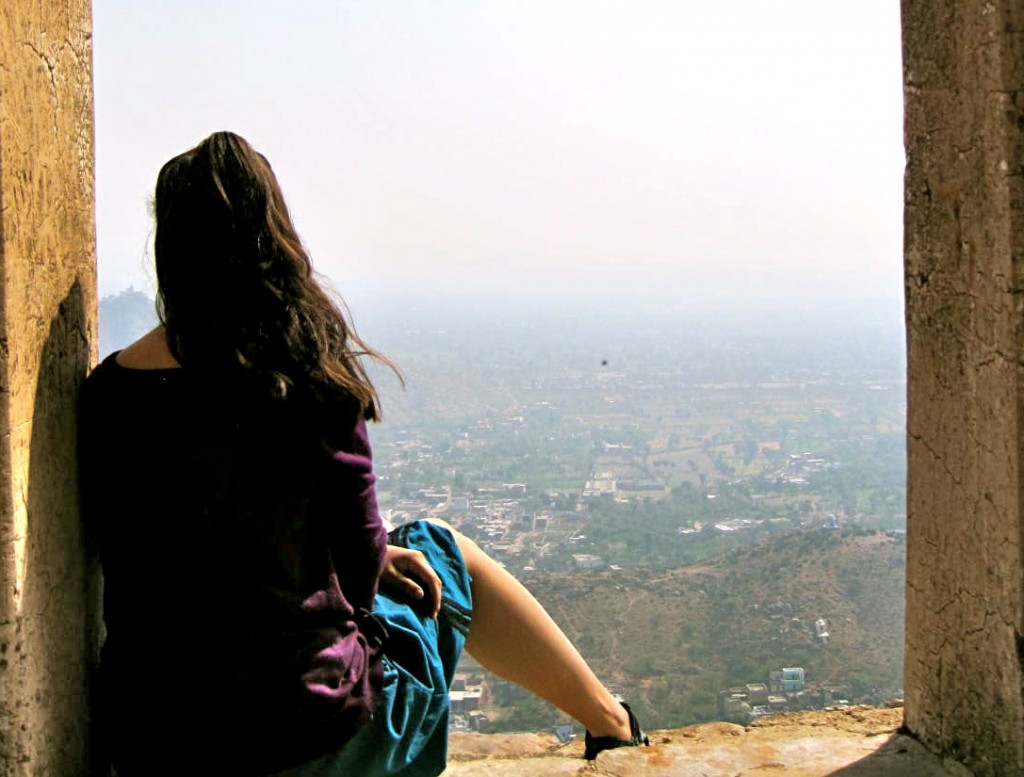
Picture: Jaipur, India
For the past six weeks I’ve travelled extensively — in my mind.
The log of my “psychological travels” is this 4,500-word essay that I wrote about my mother’s mental illness, my romantic relationship, my work with Medicaid recipients and the struggle that connects all three: how much do we invest (emotionally, financially), and when do we let go?
In a blog post in June 2014, I revealed that for the previous 12 months I had traveled no further (physically) than Hayward, Wisconsin, and Duluth, Minnesota. Yet, the books I read, the stories people told me, and the relationships I forged or furthered during that time made me feel like I traveled thousands of miles. “Staying close to home this year has made me realize that ‘travel’ isn’t so much an act of moving from physical location to physical location, as it is a way of perceiving the world,” I concluded.
The past six weeks have made me realize something else: not only do we not need to leave our hometowns to travel, we don’t even need to leave our minds! “Psychological travel,” as I’ve termed it, is the act of digging deep into our psyche, of exploring the thoughts, feelings, beliefs, and past experiences that reside there.
Once I started my psychological travels last month, I literally couldn’t stop. I found myself exploring at work and after work, while preparing a presentation, washing the dishes, briefing my boss, jogging, and taking a shower. The streets, cities, and geography I discovered in my mind—though abstract—bowled me over with their beauty, complexity, and pain.
This was tough travel over tough terrain. It reminded me of sitting in a Humvee on a 90-degree day in Afghanistan while my Army platoon drove mile after barren mile through Logar and Jaji provinces. Or walking the shit-covered ghats that lined the Ganges River in Varanasi, India. Onshore, beggars beseeched me for money, and people cremated corpses on a funeral pyre; offshore, water buffaloes cooled themselves in the water while people bathed and did their laundry.
This was tougher than that.
In an essay-writing class I took in Roanoke, Virginia, my instructor David Huddle told me again and again that he found my writing problematic because I was not going deep enough into my material.
“Lori, I hope you do try to write the longer, more complicated and challenging version of this essay,” he scrawled across a piece I’d written about Udaipur, India. “It’s very clear that you have something compelling and valuable to explore in this material. But it’s not going to let you get by with many shortcuts.”
On another essay I wrote, this one about road tripping through America’s 48 contiguous states with my immediate family, David scrawled something similar: “Your narrator is nearly invisible, and she’s so modest in telling this story that it’s as if she’s trying not to reveal anything about herself. I think it should be the opposite.”
David was right. Often, I came to my psychological travels with a destination in mind. I already knew my beginning and ending and the distance between the two. “This is going to be a 10-page essay that starts on the beaches of Tel Aviv and ends at the car dealership in Minneapolis, I’d think, before I even wrote a word. It bred mediocrity every time.
In retrospect, this habit was a defense mechanism. Psychological travel can be risky and uncomfortable and imposing order before one even embarks on the journey makes the experience less daunting. But here’s the thing: only by going outside one’s comfort zone while traveling (internationally, in one’s hometown, or in one’s mind) does a person experience anything remarkable.
Ultimately, I found my psychological travel therapeutic, but it also made me realize that there are many more streets, cities, and landscapes that remain untapped. I identified a few essays I’d like to write next, one about the emotion called anger.
“Keep throwing yourself into the fear,” another writer encouraged me. “It’s the only way, right?”

4 Responses to “Traveling in My Mind is Harder Than Afghanistan”
Carolyn Wolff
I agree totally. Throw yourself into your fear. The fear of facing anything which lurks in your mind and clutters up your life. I spent one year of my life delving into why I was so messed up for so long. It was terrifying to disassemble my life at examine it one scraggly piece at a time. It was the best thing that I ever did for myself.
Lori
Thank you. I agree. Sometimes people give “psychological travels” a bad rap and label them as narcissistic. But my opinion is that we can’t help others (and change the world) to the extent that we’re truly capable unless we first practice self care and deal with our own demons.
John Imsdahl
Some people spend their lives outside themselves, exploring the world and building relationships. Others spend their lives inside themselves, reflecting and analyzing. I suppose that you get the most out of life when you integrate the two approaches.
Lori
True. In my case, when I look back on the trajectory of my writing life, I see that I was not able to write other peoples’ stories until I first wrote — and exhausted — many of the stories about myself.